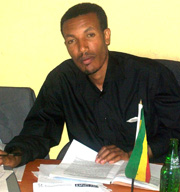New York, June 21, 2011–The Committee to Protect Journalists called on Ethiopian authorities today to immediately release journalist Woubshet Taye, at left, who has been held since Sunday.
Police picked up Taye, deputy editor of the leading independent weekly Awramba Times, at his home in the capital, Addis Ababa, at 3 p.m. and confiscated several documents, cameras, CDs, and selected copies of Awramba Times, local journalists told CPJ. The newspaper covers politics in-depth.
Taye is being held incommunicado at the federal investigation center at Maekelawi Prison in the capital, local journalists said. In an interview with CPJ, Shemelis Kemal, a government spokesman, denied any journalists were in detention in the country. “I will check but there are no journalist arrests, incarcerated in Ethiopia,” he said. “We have a law prohibiting pretrial detention of journalists. No arrest could be initiated on account of content.”
Ethiopia’s press law prohibits pre-trial detention of journalists, but two journalists of the state-controlled national broadcaster have been held on vague criminal charges for over a year, while two Eritrean journalists have disappeared in government custody since 2006, according to CPJ research. Also, under the Ethiopian constitution, police must charge or release citizens within 48 hours.
“The detention of Woubshet Taye is unlawful,” said CPJ East Africa Consultant Tom Rhodes. “We call on Ethiopian authorities to release him at once.”
Awramba Times Managing Editor Dawit Kebede, who was imprisoned for 21 months for critical coverage of a brutal government crackdown following disputed elections in 2005, has been the target of ongoing harassment by the Ethiopian administration and pro-government media outlets, according to CPJ research. Kebede won CPJ’s International Press Freedom Award in 2010 for his commitment to journalism despite the repression. The Amharic-language weekly was launched in 2008 after Kebede’s release on conditional pardon and is today the second-largest newspaper in circulation in Ethiopia, according to CPJ research.
